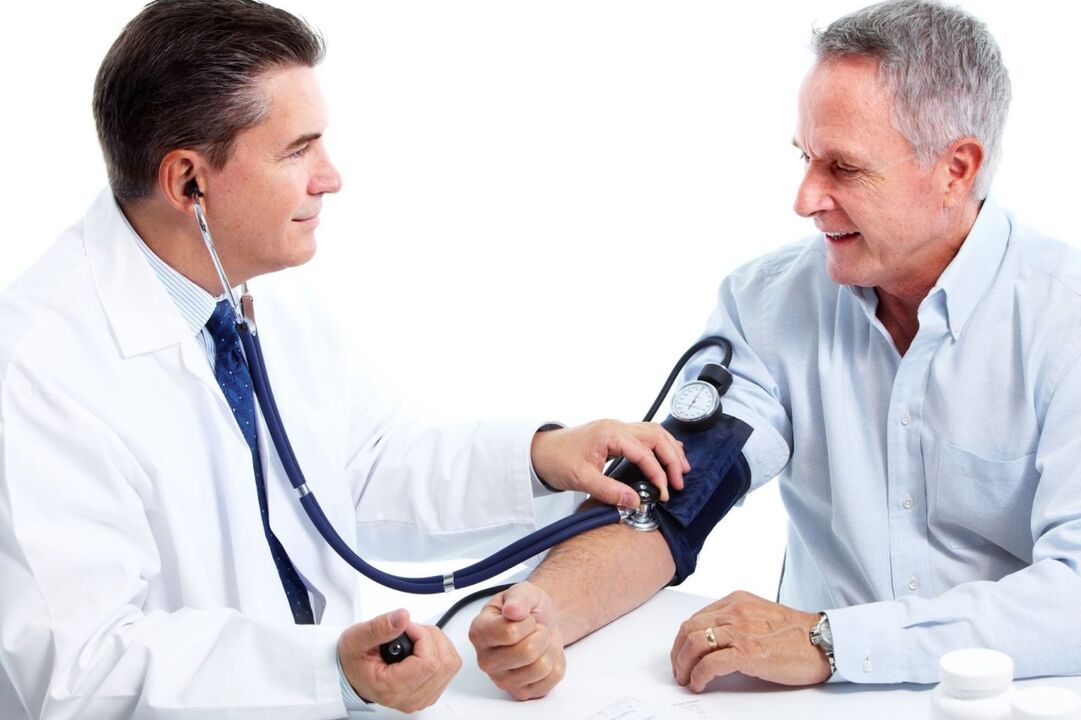With elevated blood pressure (blood pressure) or hypertension, retirees suffer, although the disease has recently become more and more to appear among young people.At the same time, people often do not suspect a serious problem, many write off a headache for a more sleep or bad weather.Lack of high pressure treatment can lead to a stroke, heart attack.Therefore, in order to detect the disease timely, it is necessary to examine in detail the main causes of hypertension.
What is hypertension
Arterial hypertension (hypertension), hypertension or hypertension is a serious chronic disease that is characterized by a persistent increase in blood pressure (while systolic upper pressure indicators are higher than 140 mm Hg and the diastolic pressure above 90 mm Hg).Hypertension is the most common disease of the cardiovascular system.An increase in blood pressure in the vessels occurs due to narrowing of the arteries and their small branches - arterioles.
The value of blood pressure depends on the peripheral resistance, the elasticity of the vessels.With irritation of the hypothalamus receptors in larger quantities, the hormones of the renin-angiotensin-aldosterone, which cause spasms of vans and arteries, thickening of their walls, begins to increase the viscosity of the blood.This leads to the appearance of arterial hypertension, which eventually becomes irreversible, stable.There are two forms of high pressure:
- Essential (primary).This is 95% of cases of hypertension.The cause of this form is the set of various factors (heredity, poor ecology, excess weight).
- Secondary.It represents 5% of cases of hypertension.High blood pressure in this form is caused by disorders in the body (kidney, liver, heart disease).
The initial stage of the disease or its hidden course may be suspected if a person is noted:
- Memory deterioration;
- headache;
- unmotivated feeling of anxiety;
- coolness;
- hyperhidrosis (increased sweating);
- Small spots in front of the eyes;
- Tingling of the fingers;
- hyperemia (redness) of the skin of the anterior zone;
- heart heart rate;
- irritability;
- low efficiency;
- Swelling of the face in the morning.
The causes of hypertension
With the normal functioning of the body, the heart drives blood through all vessels, supplying nutrients and oxygen to the cells.If the arteries lose their elasticity or obstruction, the heart begins to work more strongly, the tone of the blood vessels increases and their diameter narrows, leading to high pressure.The onset of hypertension is due to disorders of the autonomous and central nervous systems, which are closely related to emotions.Therefore, when a person is nervous, he often begins to increase pressure.
After 60 years, the development of arterial hypertension is associated with the appearance of atherosclerosis (chronic arteries) when cholesterol plaques overlap the normal blood flow.In this case, the upper pressure of the patient may increase to 170 mm Hg.Art., And the bottom remains less than 90 mm Hg.Art.Also, many doctors identify the common causes of arterial hypertension:
- disturbance of the circulation of all vital organs;
- Psycho -emotional surge;
- adhesion of the muscles of the cervical vertebrae;
- genetic pathology;
- reduction of elasticity, thickening of blood vessels;
- Hypokinesia (sedentary lifestyle);
- hormonal changes;
- Diseases of the internal organs (liver, kidneys).
- Excessive salt consumption;
- Bad habits.

At men
The appearance of hypertension is generally the subject of men aged 35 to 50 years.High blood pressure is diagnosed in patients who already have a stable form of the disease.This is due to the fact that men ignore the first signs of the disease.Often the causes of high blood pressure in the high half of humanity are provoked by their work.The disease affects those people whose activities are associated with intense physical and mental stress.Responsible workers suffer from the disease, for which every mistake is always intense stress.Other causes of hypertension in men:
- smoking, alcohol abuse;
- A sedentary lifestyle;
- non -compliance with nutritional rules (fast food, sweets);
- kidney disease (glomerulonephritis, pyelonephritis, urolithiasis);
- taking medicines (colds, colds, sleeping pills or hormonal medicines);
- neglect of physical activity;
- Problems with blood vessels (atherosclerosis);
- Traumatization of the central nervous system (central nervous system).
At the women's
Symptoms of manifestations of arterial hypertension in women and men are not very different (shortness of breath, headache, ears in the ears, dizziness), but the worse sex is much more likely to encounter such a disease.The causes of hypertension in women may differ from the similar ones in men and this is due to hormones.There are even such forms of the disease that are not at all characteristic of the strong sex - it is menopause hypertension and during pregnancy.
As a rule, in women, hypertension is diagnosed during menopause (after 45 - 50 years).At this point, the body undergoes significant changes: the number of estrogens produced begins to shrink.In addition, the causes of hypertension in women can be as follows:
- accepting contraceptives;
- stress, overload;
- insufficient amount of potassium in the body;
- Hypodynamia (sedentary lifestyle);
- excess body weight;
- poor nutrition;
- birth;
- bad habits (alcoholism, smoking);
- Diabetes sugar;
- cholesterol metabolism;
- Pathology of the kidneys, adrenal glands;
- vascular diseases;
- Apnea obstructive syndrome (respiratory arrest).
At a young age
Hypertension is rarely seen in people under 25 years of age.Often, an increase in blood pressure at a young age is associated with neurocirculatory dystonia (a complex of disorders of the cardiovascular system) when only the indicators of the upper pressure change.The cause of these violations in children may be a large load during school hours.In almost all cases, high blood pressure in the child is a consequence of the pathology of the endocrine system, ie.Children's hypertension is usually secondary.The development of arterial hypertension at a young age may have other reasons:
- hereditary factor;
- overeating, the use of large amounts of salt;
- weather conditions;
- Spinal diseases.
- electromagnetic, sound radiation;
- nervous overvoltage;
- kidney pathologies;
- taking medicines affecting the condition of blood pressure;
- overweight;
- Lack of potassium in the body.
- Dischariety with sleep regime.
The reasons for the development of hypertension
The onset of hypertension in 90 % of patients is associated with cardiovascular problems (atherosclerosis, sore heart, etc.).The remaining 10% refer to symptomatic hypertension, ie.High blood pressure is a sign of another disease (inflammation of the kidneys, adrenal tumors, narrowing of the renal arteries), hormonal insufficiency, diabetes, traumatic brain damage and stress.The risk factors for the development of hypertension are classified according to two indicators:
- Unsmined.The reasons why one cannot influence.This includes:
- Heredity.Arterial hypertension is considered to be a disease transmitted through genes.Therefore, if the family has had patients with hypertension, the disease is likely to appear in the next generation.
- Physiological factor.Medium -aged men are more susceptible to more righteous sex.This is explained by the fact that in the period 20 to 50 years the body of the woman produces more sexual hormones that perform a protective function.
- Changed.Factors that depend on a person, his lifestyle and decisions:
- A sedentary lifestyle;
- Excess weight;
- stress;
- bad habits;
- insomnia;
- the use of large amounts of caffeine, salt, cholesterol;
- administration of medicines;
- lifting weights;
- Time fluctuations.

Heredity
One of the factors of predisposition to arterial hypertension is heredity.These can be anatomical characteristics that are transmitted with genes.They are expressed in the difficulty of blood flow, which affects the increase in blood pressure.The presence of hypertension in the relatives of the first relationship (mother, father, grandparents, local brothers or sisters) means a high probability of developing the disease.The risk of the disease increases if high blood pressure is observed immediately in several relatives.
As a rule, hypertension itself is genetically hereditary, but only a predisposition to it, this is due to neuropsychic reactions and metabolic characteristics (carbohydrates, fats).Often the application of the tendency to inheritance pathology is due to external influences: nutrition, living conditions, adverse climatic factors.
Illness
Cardiovascular disease (heart disease, ischemia) can cause high blood pressure.With these disorders, the aorta's gaps are partially narrowed - this means that the pressure increases.Vascular defects in nodular polyarthritis also contribute to the growth of blood pressure.Diabetic sugar is another cause of arterial hypertension.The presence of atherosclerotic plaques narrows the lumen of the blood vessels, which is an obstacle to normal circulation.The heart begins to work in an improved mode, creating high pressure.Diseases that can provoke hypertension:
- Renal inflammation;
- pathologies of the lymphatic system and liver;
- cervical osteochondrosis;
- disorder of the pancreas and thyroid gland;
- arterial sclerosis;
- vegetative-vascular dystonia;
- adrenal tumor;
- Traumatic brain injuries;
- narrowing of the renal arteries.
Hormonal changes
Endocrine disorders (thyroid, hypothalamus, pancreas, adrenal glands) are common causes of high pressure.These pathological processes slow down the production of sex hormones and their effects on the brain of the lower append, especially for women during menopause.Serious causes of high blood pressure, contributing to excessive hormone synthesis, are the following diseases:
- Cushing Syndrome;
- Thyrotoxicosis (hyperthyroidism) - increase in thyroid function;
- neoplasms on the adrenal glands;
- Acromegaly (impaired function of the anterior pituitary gland);
- Pheochromocytoma (hormonal active tumor);
- Horse syndrome.
Age
Hypertension is generally more common in the elderly.This is due to the fact that over time the arteries lose their elasticity and this has a great influence on the pressure.In addition, in people after 40 years, metabolic processes are slowing down, against the background of consuming a large amount of high -calorie foods and an incorrect treatment of food, obesity develops and then hypertension.
Today, such a cause of the disease, such as age, has undergone changes.The disease is noticeably young, approximately 10% of adolescents are pathology and, as they increase, the percentage increases only.Every third resident suffers from high pressure after 40 years.In fact, in addition to the natural decline in body resistance, the influence of heredity, lifestyle changes with age.
Life
Another reason for arterial hypertension is the lack of physical activity.Sport has a beneficial effect on blood circulation and the body as a whole, but not many people decide to begin to lead an active lifestyle to prevent the development of hypertension.Lack of exercise causes obesity and overweight and, as a result, increases blood pressure.
Hypokinesia is a common disease of our time when a person moves a little and this leads to a violation of the work of blood vessels.Unhealthy nutrition, bad habits, improper lifestyle provokes high blood pressure, as the weakening of muscle tissue and spine reduces the tone of the blood vessels needed for good blood circulation.The work of the computer also increases the risk of illness.

Meal
The next factor contributing to the onset of high blood pressure is poor nutrition.Salt, sweet, fried, sharp, smoked and fatty foods often causes an unplanned pressure.In fact, to remove excess sodium from the body, the kidneys require a certain time.By the time this does not happen, the excess salt holds the water, which provokes swelling in people suffering from hypertension.
Lack of potassium can increase blood pressure.This element helps to relax the blood vessels and the body - without sodium.There is a lot of potassium in tomatoes, dairy products, cocoa, potatoes, legumes, parsley, plums, melons, bananas, green vegetables, sunflower seeds.These products should be included in the daily diet.It is necessary to refuse fat, fatty meat and meat with smoked because they lead to excess weight and often accompany high pressure.In addition, such foods are harmful to the body:
- oil;
- canned food;
- offal;
- fat sour cream, cream;
- sharp spices;
- flour products;
- caffeine tonic drinks;
- Sweet soda drinks.
Bad habits
The high dose of alcohol and hangover caused by this hangover has a negative effect on health of health.Regular and excessive alcohol drinking can increase heart rate, sharply increase blood pressure, cause a heart attack.Smoking also does not affect pressure.Nicotine contributes to the increase in heart rate, rapid wear of the heart, which leads to the development of coronary disease and atherosclerosis.
Tobacco and alcohol have a negative effect on the whole body.When smoking and drinking alcohol, the expansion first occurs, and then a sharp decrease in blood vessels, resulting in the creation of their spasm and the bloodstream worsens.Hence the increase in blood pressure.In addition, chemicals that are part of cigarettes are able to disrupt the elasticity of the walls of blood vessels, form plaques that clog the arteries.
Excess weight
A common cause of hypertension is obesity and excess weight.Excess weight occurs due to a sedentary lifestyle, metabolic disorders, an abundance of high fat, carbohydrates, salt.Open people are always at risk because their high blood pressure increases with the load of the vessels and the heart.
In addition, obesity increases blood cholesterol, which can cause diabetes.Patients more than weight 3 times more often suffer from hypertension than people with normal body weight.A person with obesity is more susceptible to atherosclerosis, which is an additional factor for the onset of high blood pressure.Weight loss even by 5 kg will significantly reduce blood pressure and improve blood sugar.
Ecology
Many people respond painfully to time, ie.They are dependent on the weather.Even a completely healthy person who is rarely in the fresh air and leads a sedentary lifestyle can be sensitive to a change in time.As a rule, the meteorism in people suffering from hypertension occurs in unusual climatic and landscape conditions, so that before traveling, prepare the road to the road.
Poor ecology of the city also seriously increases blood pressure, damages the cardiovascular system and develops hypertension.Even the short effect of the harmful substances that one inhales every day can provoke the development of hypertension.Three common contaminants of all modern cities - nitrogen dioxide, ozone, sulfur dioxide - have a negative effect on blood pressure and vascular function.

Stress
Nervous-emotional tension (stress, nervous breakdown, excessive emotionality) is the most common cause of hypertension.For human health, all negative and depressed emotions are dangerous.The long experience of stress is a constant stress that carries blood vessels and a heart faster than that would happen in a relaxed atmosphere.A consequence of nervous breakdown is often an increase in pressure and hypertensive crisis.Stress in combination with alcohol and smoking is particularly harmful as such a combination sharply increases blood pressure.
As a rule, in a person with hypertension, the pressure rises and lasts longer, even with a slight emotional stress.Gradually, with repetitions of increased blood pressure, which can last for many months, the apparatus responsible for regulating blood pressure, convenes for the load and the blood pressure is slowly fixed at a certain level.























